Can You Freeze Asparagus?

Whether you grow it in your garden or pick it up at local stores, farms or markets, you may find yourself with an excess of asparagus during its growing season, leading you to ask: "Can you freeze asparagus?" Depending on where you live, finding fresh asparagus can be quite a quest. So, whenever you spot it at the farmer’s market or at your local grocery store, all you can think about is how to maximize its use.
Conveniently, you can freeze asparagus to extend its life and have some on hand at all times, even when it's out of season. You may have some concerns with this as certain vegetables experience changes in texture or flavor when frozen. But, is this the case with asparagus? And what exactly can you do with frozen asparagus? To find out, keep reading for an in-depth guide to freezing asparagus and incorporating the frozen vegetable in your recipes.
- Can Asparagus Be Frozen?
- How To Freeze Asparagus
- How To Cook Frozen Asparagus
- Is Frozen Asparagus Healthy?
Can Asparagus Be Frozen?
Can you freeze fresh asparagus? Yes, freezing fresh asparagus it’s a great way to preserve it when it’s in season. However, keep in mind that freezing it can affect both texture and flavor. Fresh asparagus has a crunchy texture and vibrant flavor, but when frozen, it can become slightly softer and lose some of its fresh taste. To minimize these changes and preserve its flavor and texture, it’s recommended to blanch the asparagus before freezing.

Can You Freeze Fresh Asparagus?
Yes, you can freeze fresh asparagus. Doing this is a perfect solution if you have purchased or grown a little too much during asparagus season. As mentioned, the best way to ensure you preserve its quality is to blanch it first. Blanching involves boiling the asparagus for a brief period, then quickly cooling it in ice water to halt the cooking process. This will help maintain its color, flavor and nutritional value.

Can You Freeze Asparagus Raw?
Freezing raw asparagus is not recommended because it often leads to loss of flavor and texture. It’s always better to blanch the asparagus before freezing it. After blanching, you can thoroughly dry the asparagus and store it in airtight containers or freezer bags before placing it in the freezer. If you’re in a pinch and don’t have time to blanch, asparagus can be frozen raw and added to dishes like soup.

Can You Freeze Cooked Asparagus?
Yes, you can freeze cooked asparagus, although it might suffer changes in its flavor and texture. To freeze cooked asparagus, it's best to cool it completely before placing it in airtight containers. Try to remove as much air as possible to prevent freezer burn and maintain the asparagus' quality. While freezing cooked asparagus is convenient for meal prep or to avoid wasting food, it will not have the same crisp texture as fresh or blanched asparagus. However, you can still use it for soups, casseroles and similar dishes.
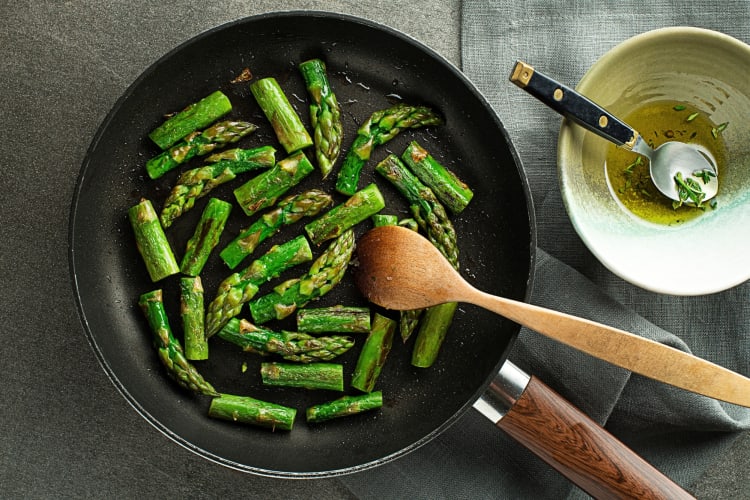
Can You Freeze Cream of Asparagus Soup?
Cream of asparagus soup can be frozen to enjoy at a later date, however, there are certain considerations to keep in mind. Dairy-based soups, such as cream of asparagus, can sometimes separate or become grainy when frozen or reheated.
To minimize this, you can prepare the soup without adding dairy and freeze it. When you’re ready to serve, thaw the soup, reheat it and then add the cream or milk. If you still prefer to freeze the soup with the dairy included, ensure to stir it well after reheating to help recombine the ingredients.
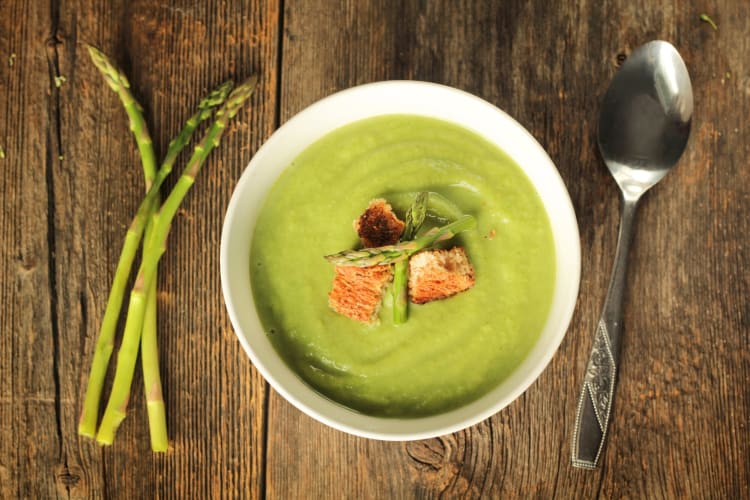
How To Freeze Asparagus
Now that we’ve answered the question: “Can you freeze asparagus?” let's look a little more at how best to freeze it. The best method is to wash and trim the asparagus before blanching it. Do this by briefly boiling it in water and then transferring it into an ice bath to cool. Dry the asparagus, separate it into a single layer on a baking sheet and freeze for a few hours. Once frozen, transfer the asparagus to airtight containers or freezer bags. Use the frozen vegetables within five to seven months at most.

How To Freeze Fresh Asparagus
To freeze fresh asparagus, start by washing it and trimming off the tough and woody ends. Next, blanch the asparagus by boiling small spears for two minutes, medium spears for three minutes and large spears for four minutes. The next step is to spread the asparagus in a single layer on a baking sheet and take it to the freezer for one to two hours. Once frozen, transfer to airtight containers or freezer bags and store in the freezer until you need the asparagus. You can also add fresh asparagus directly to airtight containers for freezing, but skipping the blanching step can affect the quality and taste of the frozen asparagus.

How To Blanch Asparagus for Freezing
As mentioned, blanching is the best method to follow for freezing asparagus. If you want to use this method, here are the full steps on blanching asparagus for freezing:
- Prepare the Asparagus: Select fresh, firm asparagus stalks with tightly closed tips. Wash the asparagus under cool running water to remove any dirt. Trim off the woody ends and cut the asparagus into smaller pieces.
- Boil Water: Bring a large pot of water to a rolling boil. Keep in mind you’ll need enough water to fully submerge the asparagus.
- Prepare an Ice Bath: While the water is heating, prepare an ice bath by filling a large bowl with ice and cold water.
- Blanch the Asparagus: Once the water is boiling, add the asparagus. Blanch the spears. The duration depends on the size of the asparagus but generally, leave the asparagus for one to two minutes.
- Cool: After blanching, use a slotted spoon or tongs to transfer the asparagus from the boiling water to the ice bath. Let the asparagus sit in the ice water for the same amount of time it was blanched or until it is fully cooled.
- Dry the Asparagus: After cooling, drain the asparagus. Pat it with a clean kitchen towel or use a salad spinner to remove excess moisture.
- Flash Freeze: Spread the blanched and dried asparagus in a single layer on a baking sheet. Place the baking sheet in the freezer for one to two hours until the asparagus is firm.
- Package and Store in the Freezer: Transfer the frozen asparagus to airtight containers or freezer bags. Label the containers with the date and store them in the freezer. They can last up to 12 months.
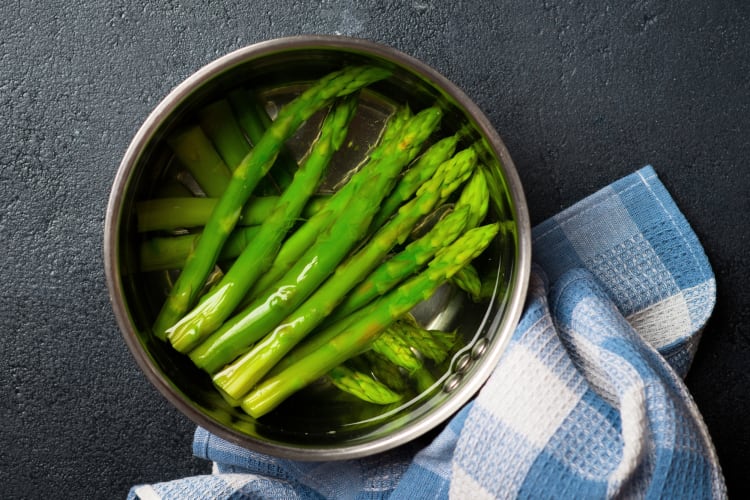
How To Freeze Asparagus Without Blanching It
Can you freeze asparagus without blanching it? Yes you can, however, it may result in a loss of color, flavor and texture over time. But, if you prefer to skip the blanching step, here’s how to freeze asparagus without blanching it.
Start by washing and trimming the asparagus. Cut into smaller pieces if desired or leave the stalks whole, depending on how you want to use them later. After washing and cutting the spears, pat them dry with a clean towel to remove excess moisture and prevent the formation of ice crystals.
Next, spread the dried asparagus on a baking sheet, ensuring the pieces are not touching. Place the baking sheet in the freezer for up to two hours until the asparagus is firm. Finally, transfer the frozen asparagus into freezer bags or airtight containers, removing as much air as possible if using bags.

How Long Can You Freeze Asparagus?
In most cases, you can freeze frozen vegetables without changing their nutritional value, taste or texture. But is this the same case for asparagus? Asparagus can be frozen for up to five to seven months while maintaining good quality and nutrition. To ensure the best results, it's key to follow the proper preparation and storage techniques as explained above. Over time, while the asparagus can be safe to eat, its flavor might diminish and the texture could become soft or mushy when thawed.

How To Cook Frozen Asparagus
Frozen asparagus is versatile and can be used directly from the freezer in many recipes without needing to defrost it first. You can roast, sauté, steam or even microwave it to create a variety of dishes. However, if a recipe specifically calls for fresh asparagus or you prefer a certain texture, it's better to thaw it first.

How To Defrost Asparagus
To defrost frozen asparagus, there are a few effective methods to preserve its quality. One method is to place the frozen asparagus in a bowl of cold water. This allows it to thaw slowly within 30 minutes. Make sure to change the water if it becomes too cold. You can also use the defrosting setting on your microwave, checking and stirring occasionally to ensure even thawing.
Another option is to thaw the asparagus in the refrigerator. Transfer the frozen asparagus to a bowl or container and leave it in the fridge for a couple of hours or overnight. This is a slower method but it helps in maintaining the fresh and crisp texture and flavor of the asparagus. Once thawed, drain any access water and dry before using it in your recipes.
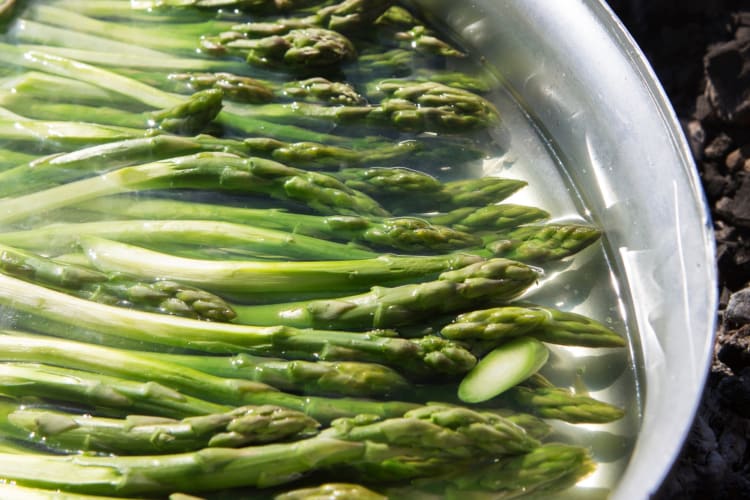
Frozen Asparagus Recipes
Now that you know that you can freeze asparagus and how to thaw it, what can you make with it once it's defrosted? There are many delicious recipes you can use with this versatile vegetable, with the following being just a few of the many options.
1. Asparagus Risotto
Make a decadent risotto by sautéing onions or garlic in olive oil, then adding risotto rice and white wine. Gradually add hot chicken or vegetable broth while stirring until the rice is cooked. Stir in frozen asparagus during the last 10 minutes of cooking, allowing it to thaw and heat through. Finish by adding grated Parmesan cheese and a squeeze of lemon juice.
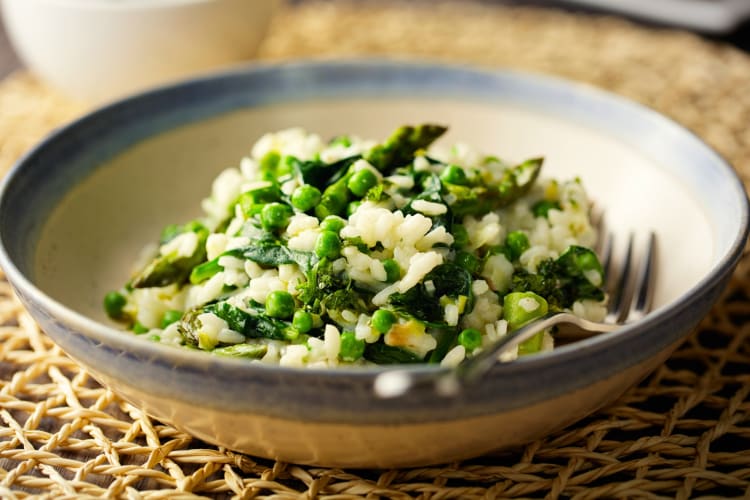
2. Asparagus and Chicken Stir Fry
In a hot skillet or wok, stir fry bite-sized pieces of chicken breast with garlic and ginger until the chicken is cooked through. Add frozen asparagus and cook until it’s heated through and tender-crisp. Toss in a simple sauce made from soy sauce, oyster sauce and a drizzle of honey. You can serve this with noodles or white rice.

3. Creamy Asparagus Soup
Start by sautéing onions and garlic in a pot with olive oil or butter. Add chopped potatoes and frozen asparagus, then cover with chicken or vegetable broth. Simmer until the vegetables are tender. Blend the soup until smooth and stir in some cream or milk for added richness. You can season with salt, pepper and even a pinch of nutmeg.

Is Frozen Asparagus Healthy?
There's always the "frozen asparagus vs. fresh asparagus" debate in terms of nutritional value. Fresh asparagus, when in season, offers a crisp texture and delicious flavor. It’s free from any processing and is rich in vitamins A, C, E, and K as well as folate, fiber and antioxidants.
When asparagus is frozen, these nutrients are largely preserved, especially if it is blanched before freezing. Blanching is the best method to retain most of the vitamins, minerals and antioxidants found in fresh asparagus.
The bottom line is that while fresh asparagus is nutrient-dense and offers a superior texture, the nutrient loss in frozen asparagus is minimal. Therefore, frozen asparagus still provides a great source of essential nutrients and is a convenient option when fresh asparagus is not available.

So, can you freeze asparagus? Absolutely! In fact, you can make the most of this delicious delight by buying a lot when in season and freezing it for use throughout the year. This process will preserve its nutrients and flavor, allowing you to enjoy your favorite asparagus dishes any time you'd like.
For even more ways to explore your favorite foods, check out other experiences happening on Cozymeal.
